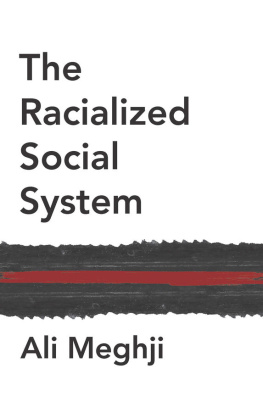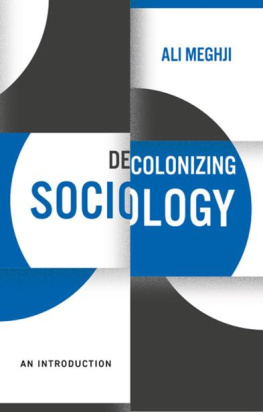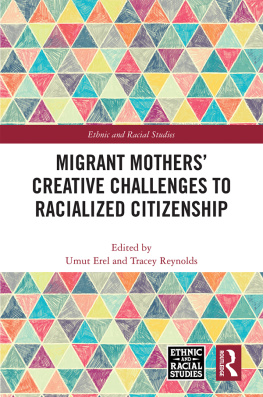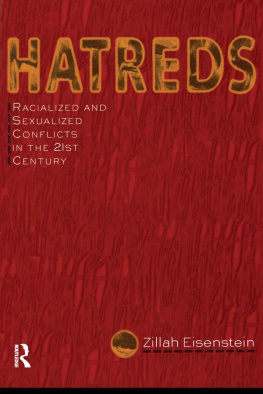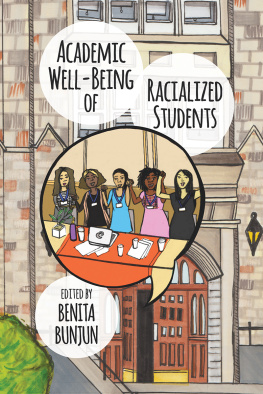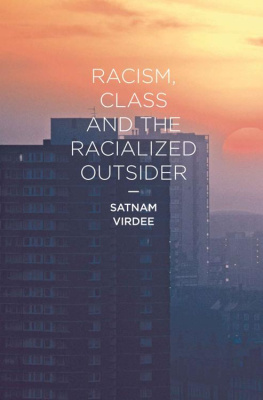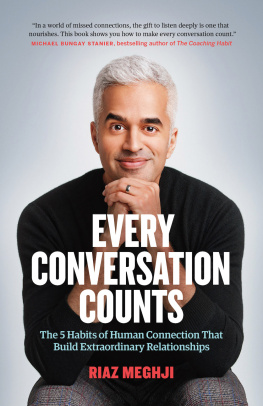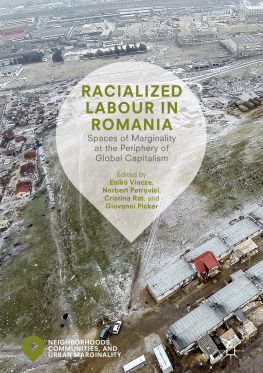Ali Meghji - The Racialized Social System
Here you can read online Ali Meghji - The Racialized Social System full text of the book (entire story) in english for free. Download pdf and epub, get meaning, cover and reviews about this ebook. year: 2022, publisher: Wiley, genre: Politics. Description of the work, (preface) as well as reviews are available. Best literature library LitArk.com created for fans of good reading and offers a wide selection of genres:
Romance novel
Science fiction
Adventure
Detective
Science
History
Home and family
Prose
Art
Politics
Computer
Non-fiction
Religion
Business
Children
Humor
Choose a favorite category and find really read worthwhile books. Enjoy immersion in the world of imagination, feel the emotions of the characters or learn something new for yourself, make an fascinating discovery.
- Book:The Racialized Social System
- Author:
- Publisher:Wiley
- Genre:
- Year:2022
- Rating:5 / 5
- Favourites:Add to favourites
- Your mark:
- 100
- 1
- 2
- 3
- 4
- 5
The Racialized Social System: summary, description and annotation
We offer to read an annotation, description, summary or preface (depends on what the author of the book "The Racialized Social System" wrote himself). If you haven't found the necessary information about the book — write in the comments, we will try to find it.
The Racialized Social System — read online for free the complete book (whole text) full work
Below is the text of the book, divided by pages. System saving the place of the last page read, allows you to conveniently read the book "The Racialized Social System" online for free, without having to search again every time where you left off. Put a bookmark, and you can go to the page where you finished reading at any time.
Font size:
Interval:
Bookmark:
Ali Meghji
polity
Copyright Ali Meghji 2022
The right of Ali Meghji to be identified as Author of this Work has been asserted in accordance with the UK Copyright, Designs and Patents Act 1988.
First published in 2022 by Polity Press
Polity Press
65 Bridge Street
Cambridge CB2 1UR, UK
Polity Press
101 Station Landing
Suite 300
Medford, MA 02155, USA
All rights reserved. Except for the quotation of short passages for the purpose of criticism and review, no part of this publication may be reproduced, stored in a retrieval system or transmitted, in any form or by any means, electronic, mechanical, photocopying, recording or otherwise, without the prior permission of the publisher.
ISBN-13: 978-1-5095-3994-9
ISBN-13: 978-1-5095-3995-6 (pb)
A catalogue record for this book is available from the British Library.
Library of Congress Control Number: 2021950727
by Fakenham Prepress Solutions, Fakenham, Norfolk NR21 8NL
The publisher has used its best endeavours to ensure that the URLs for external websites referred to in this book are correct and active at the time of going to press. However, the publisher has no responsibility for the websites and can make no guarantee that a site will remain live or that the content is or will remain appropriate.
Every effort has been made to trace all copyright holders, but if any have been overlooked the publisher will be pleased to include any necessary credits in any subsequent reprint or edition.
For further information on Polity, visit our website: politybooks.com
Just over a century ago, W. E. B. Du Bois published Darkwater: Voices from Within the Veil. This book is packed with history, theology, autoethnography, hymns and poetry. One of his central messages is that the world can be otherwise. We live in a time and geopolitical climate marked by anti-intellectualism and campaigns against critical thinking; nothing seems more clear than that we need the world to be otherwise, and thus I wish to begin this book with Du Bois comment:
From my narrowed windows I stare into the night that looms beneath the cloud-swept stars. Eastward and westward storms are breaking, great, ugly whirlwinds of hatred and blood and cruelty. I will not believe them inevitable. I will not believe that all that was must be, that all the shameful drama of the past must be done again today before the sunlight sweeps the silver sea.
If I cry amid this roar of elemental forces, must my cry be in vain, because it is but a cry, a small and human cry amid Promethean gloom?
In September 2020, President Donald Trump described critical race theory (CRT) as being like a cancer, labelling CRT as an anti-American ideology deployed to rip apart friends, neighbours, and families. This presidential furore resulted in an executive order which banned the teaching of CRT in employee training schemes run by the federal agency or any company with a government contract. Across the Atlantic, those in Britain were happy to echo Trumps disparaging of CRT. The states Minister for Equalities, Kemi Badenoch, claimed that the government stood unequivocally against critical race theory, while reactionary actor-turned-politician Laurence Fox wrote: Lets call Critical Race theory by its real name. Modern Racism. Its organised and its scary,
However, despite having a shared hostility towards CRT, such commentators often had quite disparate accounts of what CRT actually is. While Trump lumped together CRT with Marxist ideology and the supposed militarism of Black Lives Matter, in Britain CRT was seen as being an offshoot of the decolonizing movement which sought to recognize the darker side of Britains history, and in Australia CRT was seen as being part of a wider wokeist social justice movement. Indeed, academics likewise have differed quite radically in their understandings of what CRT is. While several Marxist critics have seen CRT as being an assertion of race-centrism steeped in identity politics (for instance Cole 2009a, 2009b), other scholars more sympathetic to the CRT project have still described it as not a unified theory but a loose hodgepodge of analytic tools that are frequently used in a catch-as-catch-can manner (Trevio et al. 2008: 9). Indeed, CRT is not even mentioned in Emirbayer and Desmonds (2015: 1) recent survey of theories of race/ism, despite their assertion that there never has been a comprehensive and systematic theory of race.
In a sense, these brief anecdotes quite neatly summarize both why I write this book, and how I will approach the books content. On the one hand, this book is written very much as an attempt to define the conceptual contours of CRT through what has been termed the racialized social system approach. Through showing how the racialized social system approach is a social theory, this book therefore highlights how CRT offers a flexible framework used to study contemporary societal arrangements in a way that is grounded in empirical research. Central to the racialized social system approach is the attempt to show how racial inequality is embodied in the structure of society and reproduced through the micro, meso and macro levels. Of course, it is through exposing this structural presence of racism that CRT has managed to attract such a large following of reactionary disparagement. In this regard, I also write this book to show how the public and political responses to CRT often demonstrate the very same points that CRT seeks to make about how racism becomes hidden away and denied in society. Furthermore, if we think about these public criticisms of CRT, they are not limited to one nation state but instead spread transnationally. While CRT is often construed as being a US-centric paradigm of thought, this book therefore shows how by virtue of being a social theory grounded in empirical research CRT offers a flexible approach to the study of racial inequality across space and time.
There is a difference between conceptual flexibility and theoretical universalism. As highlighted by postcolonial and decolonial approaches, universalism is characterized by an assumption that despite a theory being the product of such a specific milieu [] the thoughts produced [] simply apply universally (Connell 2018: 401). Claims to universalism are thus layered in relations of epistemic domination, constituted by a chauvinism where the Theory is the Theory of everything, and everything must be comprehended through the lens of this Theory.
It is not the aim of this book to present a picture of CRT as a conceptual framework that can study all dimensions of racialization and racism across all of time and space. Such a universalism, in fact, would be in tension with CRTs mission to battle epistemic inequality and to theorize creatively in and through empirical research. Rather, it is my aim to show how CRT particularly through the racialized social system approach despite emerging from a very specific discipline of legal studies, at a very specific time in the US post-civil rights era, does in fact offer a flexible conceptual framework that is useful for the study of racialization and racism across the world. Of course, before proceeding into a fuller discussion of such conceptual flexibility, it is useful to first clarify these roots and routes of CRT.
The reactionary criticisms of CRT especially in the US tend to paint a picture of CRT as being endemic across the arts, humanities and social sciences since the 1980s. The reality of the situation is that CRT actually has a narrower intellectual lineage.
Font size:
Interval:
Bookmark:
Similar books «The Racialized Social System»
Look at similar books to The Racialized Social System. We have selected literature similar in name and meaning in the hope of providing readers with more options to find new, interesting, not yet read works.
Discussion, reviews of the book The Racialized Social System and just readers' own opinions. Leave your comments, write what you think about the work, its meaning or the main characters. Specify what exactly you liked and what you didn't like, and why you think so.

